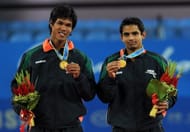In the modern era, it is quite shameful to even imagine a situation under which a top-level tennis player is not able to pursue a career due to lack of competitive training or sponsorship. In our country, both key aspects are lacking.
While travelling for tournaments across the globe and chasing those elusive ATP points, increasing expenses and a lack of support from state associations are a constant concern for tennis players.
What’s the worst? Some state associations don’t even bother to care enough about the player’s needs. The organisation in question is the Karnataka State Lawn Tennis Association (KSLTA).
Tamil Nadu’s organisation (TNTA), under the guidance of its vice president Karti Chidambaram, funds it’s home grown champions’ training in Spain. In Karnataka, talented youngsters are either quitting in droves or applying an NOC (No Objection Certificate) to move to another state.
A recent example of this is Karnataka’s number 1 player Sharmada Balu. She is in constant touch with the TNTA, and has even applied to move to that state and represent them in order to procure the benefits offered by them.
“In order to gain ATP points, we need to play as many tournaments in Europe, Spain and Asian countries. Though the associations are aware of that, there’s nothing much they would do. TNTA is probably the only state to send their top players to train and compete abroad,” expressed the 19-year old Sharmada.
Unfortnately, Sharmada’s story is not an exception. Only a few lucky ones have access to sponsorships or get funds from state associations, while the rest depend on their parents’ earnings. To overcome the deficit, parents are often forced to take loans from banks or sell their property.
Pooja Sree, another top Indian player from Mysore who held India number 2 position, is a testament to that. She too suffered from a lack of support from the state Government. Her father shouldered her financial needs as much as he could, but couldn’t sustain. She slowly faded away, and doesn’t even figure in the circuit these days.
The worst part for these players is that they don’t avail any medical benefits from the Government either. Though the sport is highly injury-prone, no one even bothers to help them with their medical needs.
Shockingly, an established player who has won the Asian Games gold in the men’s doubles, Sanam Singh too doesn’t have a sponsor. He funds his own trips abroad for training and competition.
“I don’t have a sponsor yet. Though I am in Mahesh Bhupathi-run Globo Sport, I haven’t got a sponsor and I need to get my ranking up to get one,” he told Sportskeeda.
But how is one to get his ranking up without sufficient support?
Things get harder to fathom especially when the state-run associations have big-wigs in their committee.
Swallow this: The president of KSLTA is the former chief minister SM Krishna, who also was the ex-union minister for foreign affairs. The home minister R Ashoka is the vice-president of KSLTA. Now, with people with strong contacts at the helm of affairs, can’t one get a few lakhs as funding? Not from their own pockets, but at least from corporates? If a neighbouring state (Tamil Nadu) can make a difference, then why not Karnataka?
Karti Chidambaram was asked why Karnataka were not able to make use of the immense talent in the state and the high-profile names in the administration. He replied:
“No comments as I am not aware of the developmental programmes in Karnataka. It is pertinent to note that the KSLTA is conducting a significant number of ITF Futures for both Men and women. This is a big boost for the local talent.”
Karti went on to add that it wasn’t easy for a Sanam Singh or a Vishnu Vardhan to get sponsorships on their own.
“Why would a corporate want to invest in them in the first place? What mileage will they get? Apart from Sania Mirza, no player in India has got sponsorship.”
In such a case, it becomes the Government’s responsibility to fund the talented.
Though Karnataka is known for producing the crème of tennis players in the country, the inaccessibility of required facilities has ensured that many youngsters and their parents’ dreams are never translated into reality.

